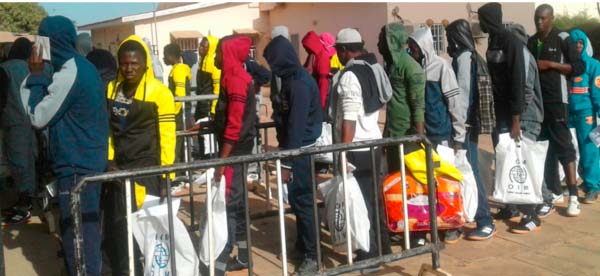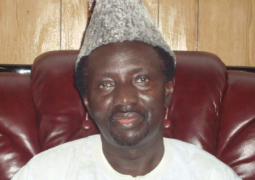
At
least 469 Gambians have been repariated from Libya this year since President Adama
Barrow took power and more are expected to return before the year ends.
Up
to 160 Gambians who were languishing in Libyan jails were repatriated to The
Gambia late on Thursday night through the support of the International
Organization for Migration.
This
is the third time the IOM has repatriated Gambians this year. About 140
Gambians were onboard IOM’s first chartered flight from Libya which arrived in
Banjul on March 10.
A
second flight from Libya, carrying 169 stranded Gambians, followed on 4 April,
and another 290 have signed up for IOM’s EU-funded voluntary return programme,
the IOM said.
The
Gambia is one of Africa’s smallest nations, with a population of just under two
million.
And
yet its citizens have consistently ranked among the top five nationalities
taking the Central Mediterranean route from Libya to Italy.
Since
the fall of The Gambia’s strongman Yahya Jammeh, hundreds of young migrants who
left The Gambia to go to Europe via Libya have started coming back.
Bubacarr
Touray, 24, who was among the repatriated Gambians, said their living
conditions in Libya, especially in jails, were “horrible”.
“There
are people who have been shot dead by gunmen and no one knows who they are,
whether government or rebels,” Touray said as they arrived at the Banjul
International Airport.
Sulayman
Ceesay, 26, also a Gambian jailed in Libya, said sometimes they are denied food
and water in jail.
“It
is the IOM that helped us with food when they found us in jail,” Ceesay said.
The
deputy permanent secretary at The Gambia’s Foreign Affairs Ministry, Ebrima
Jobe, told journalists at the airport that the security situation in the North
African country makes it difficult for countries to access people in jails.
“There
is conflict in Libya and that makes it difficult for countries to send a
delegation there,” he said.
Giuseppe
Loprete, the head of IOM mission in Niger, a desert country bordering Libya,
said that migrants they have encountered telling stories of abuse,
exploitation, false promises and violence.
From
2016 to March 2017, the IOM has facilitated the voluntary return of 6,500
migrants from Libya and Algeria to Senegal, Guinea Conakry including 600 from
The Gambia.
“In
many cases these journeys last for months and smugglers are always asking for
money to continue. Migrants are forced to call their families who send them
money. If they do not, migrants are abandoned in the desert or remain in
detention especially in Libya,” Loprete said.
“Many
migrants of different nationalities – including Gambia – reported stories of
exploitation, including slavery, at the hands of smugglers from different
nationalities. Criminal networks are well developed and migrants are victims of
this system. They pay to travel, and then they pay to eat and remain in
transit, then pay again to be released if they are lucky,” he added.
According
to the official figures from the Italian Ministry of Interior, 11,929 Gambians
arrived in Italy in 2016 and 2,232 in March 2017 alone.
The
Gambia is among the top 10 countries for arrivals on Italian shores.
In
Libya, IOM and the UN estimate that 250,000 migrants are present, most of them
without resources to reach Tripoli or to go back. They are stranded and in need
of urgent help.
“While
the IOM has no information on people detained in jails; based on these figures
it is likely that thousands of Gambians are currently in Libya, in various
locations and are likely in need of help to return home safely,” Loprete said.
There
were 21 Gambian minors among the returnees as well as three women and two
people who were badly injured.
Loprete
said Gambians continue to be among the main nationalities using the desert
route to Italy via Libya and that has not changed over the last two to three
years.
“In
particular Gambian nationals are younger than others, many unaccompanied minors
are among them and this is an additional challenge as their return has to be
coordinated with the judges after the family is informed,” he stated.
However,
Gambians who returned in the country on April 4 have now formed an association
to discourage the irregular migration through the desert route.
Mustapha
Sallah, the association’s secretary general, told journalists that they “want
to help the youth of The Gambia and fight against irregular migration”.
Youth
unemployment in Gambia is currently at 38%.
Gambians
returnees have told journalists that there are dozens of Senegalese in Libyan
jails who long to come back home but their consulate in Tripoli is not helping
them.
“Senegalese
are in the same jails as us but their consulate is asking for money to help
them. They are suffering,” they alleged.
Gambian
returnees have thanked the Gambian consulate who they said are working “very
hard” in Libya to save the people.


